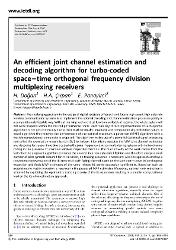An efficient joint channel estimation and decoding algorithm for turbo-coded space-time orthogonal frequency division multiplexing receivers
Abstract
The challenging problem in the design of digital receivers of today's and future high-speed high data-rate wireless communication systems is to implement the optimal decoding and channel estimation processes jointly in a computationally feasible way. Without realising such a critical function perfectly at receiver the whole system will not work properly within the desired performance limits. Unfortunately direct implementation of such optimal algorithms is not possible mainly due to their mathematically intractable and computationally prohibitive nature. A novel algorithm that reaches the performance of the optimal maximum a posteriori (MAP) algorithm with a feasible computational complexity is proposed. The algorithm makes use of a powerful statistical signal processing tool called the expectation-maximisation (EM) technique. It iteratively executes the MAP joint channel estimation and decoding for space-time block-coded orthogonal frequency division multiplexing systems with turbo channel coding in the presence of unknown wireless dispersive channels. The main novelty of the work comes from the facts that the proposed algorithm estimates the channel in a non-data-aided fashion and therefore except a small number of pilot symbols required for initialisation no training sequence is necessary. Also the approach employs a convenient representation of the discrete multipath fading channel based on the Karhunen-Loeve (KL) orthogonal expansion and finds MAP estimates of the uncorrelated KL series expansion coefficients. Based on such an expansion no matrix inversion is required in the proposed MAP estimator. Moreover optimal rank reduction is achieved by exploiting the optimal truncation property of the KL expansion resulting in a smaller computational load on the iterative estimation approach.
















